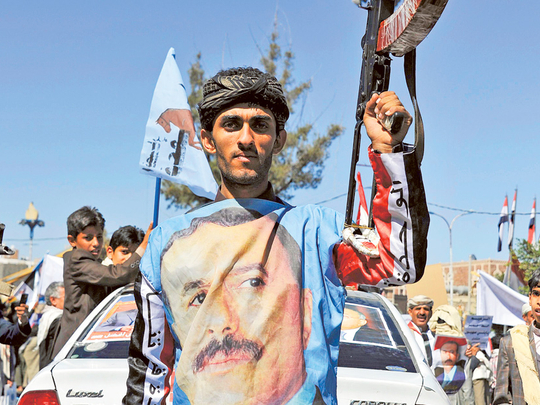
Sana’a: Yemen has announced a new 36-member government intended to take the impoverished country out of political crisis, the state news agency Saba said.
Formation of the new cabinet on Friday, under a peace deal agreed when Al Houthi rebels seized the capital on September 21, had been delayed because of tensions between the rebels and their political rivals.
The United States welcomed the formation of the new government, and encouraged the impoverished Arab nation to overcome partisan politics following the weeks of turmoil.
The US National Security Council called on all political actors “to continue to cooperate in the new government,” spokeswoman Bernadette Meehan said in a statement.
“This multi-party cabinet must represent the strength of Yemeni unity over individual and partisan interests that may seek to derail the goals of a nation,” Meehan said.
The new government includes four women, one of whom takes the information and culture portfolio. Four members of the outgoing cabinet were reappointed and three more changed portfolios.
Career diplomat Abdullah Al Saidi becomes foreign minister, and the new defence minister is General Mahmud Al Subaihi, who was commander of the 4th Military Region.
Political police chief General Jalal Al Ruishen becomes interior minister.
On November 1, the main political parties signed a new agreement, sponsored by UN envoy to Yemen Jamal Bin Omar, for the formation of a government of technocrats.
Under the accord, representatives of the rebels and their rivals, the Sunni Al Islah (Reform) Islamic party, mandated President Abd Rabu Mansour Hadi to form a government and committed to support it.
“It is a compromise agreed to overcome the question of sharing out ministerial portfolios between the various groups” behind the political stalemate, signatory Abdul Aziz Jubari of the liberal Justice and Construction party told AFP at the time.
In the wake of the new agreement, Bin Omar warned in an interview with AFP that without the rapid formation of a government, tensions between Shiites and Sunnis were likely to increase, sinking the country deeper into crisis.
Earlier Friday, thousands of supporters of former president Ali Abdullah Saleh and the Shiite rebels took to the streets to protest threatened UN sanctions against the ousted strongman and insurgent chiefs.
Saleh, who stepped down in early 2012 after a year of Arab Spring-inspired protests, is seen as the main backer of the rebels.
His General People’s Congress (GPC) party called for the protests, warning that any sanctions would exacerbate the crisis in Yemen.
The UN Security Council was set to endorse a US-drafted proposal to slap a visa ban and assets freeze on Saleh and two of his allies, Al Houthi rebel commanders Abd Al Khaliq Al Houthi and Abdullah Yahya Al Hakim, diplomats in New York said on Tuesday.
The 15 members of the Security Council have until Friday evening to raise objections before the proposal returns to the sanctions committee for action.
The top UN body in August called on Al Houthi rebels to end their armed uprising against President Hadi and warned of sanctions against those who threaten the stability of Yemen, a key US ally in the fight against Al Qaida.











